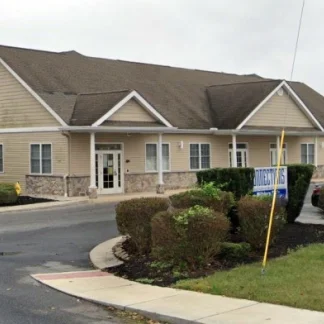Connections Community Support Programs
Connections Community Support Programs (CSP) is a drug and alcohol treatment cen...
Connections CSP - Landing Road is a non-profit organization that provides services to individuals struggling with mental health and substance abuse issues. Services include individual and group counseling, medication-assisted treatment and DUI treatment services. Connections CSP - Landing Road is located at Millsboro, Delaware.
Connections also provide outpatient DUI treatment. Before getting into the treatment, individuals must complete the intake and referral process through the Delaware Evaluation and Referral Program (DERP). Classes are available for Spanish-speaking clients.
Case management is available including help in securing financial assistance, transportation, child care, housing and employment.
Contact us for more information: (866) 477-5345

Connect with Connections CSP - Landing Road by calling their admissions team directly.
(866) 477-5345 Website Get DirectionsAssertive Community Treatment (ACT) is a structured way of helping those with major mental illnesses and/or substance abuse by bringing services directly to the patient in home. Instead of hospitalization or an outpatient program, staff members like social workers, psychiatrists, and counselors come directly to the patient’s house for treatment. ACT is used primarily for those with severe and persistent mental illness like schizophrenia or bipolar disorder, some of whom also contend with substance abuse. ACT can be short- or long-term (months to years), and provides the same multidisciplinary, 24/7 staffing of a psychiatric unit, but in the comfort of the patient's own home and/or community.
Group therapy is any therapeutic work that happens in a group (not one-on-one). There are a number of different group therapy modalities, including support groups, experiential therapy, psycho-education, and more. Group therapy involves treatment as well as processing interaction between group members.
In individual therapy, a patient meets one-on-one with a trained psychologist or counselor. Therapy is a pivotal part of effective substance abuse treatment, as it often covers root causes of addiction, including challenges faced by the patient in their social, family, and work/school life.
Group therapy is any therapeutic work that happens in a group (not one-on-one). There are a number of different group therapy modalities, including support groups, experiential therapy, psycho-education, and more. Group therapy involves treatment as well as processing interaction between group members.
In individual therapy, a patient meets one-on-one with a trained psychologist or counselor. Therapy is a pivotal part of effective substance abuse treatment, as it often covers root causes of addiction, including challenges faced by the patient in their social, family, and work/school life.
In individual therapy, a patient meets one-on-one with a trained psychologist or counselor. Therapy is a pivotal part of effective substance abuse treatment, as it often covers root causes of addiction, including challenges faced by the patient in their social, family, and work/school life.
Connections Community Support Programs (CSP) is a drug and alcohol treatment cen...